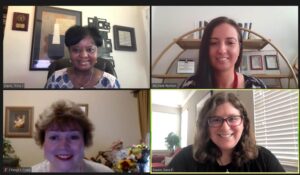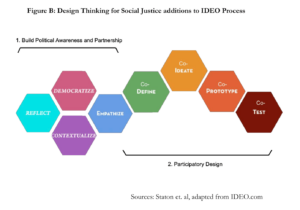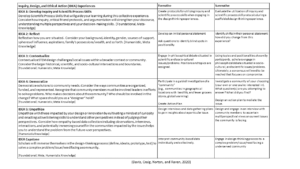Inquiry, Design, and Ethical Action Scholars (IDEA-S) Certificate
Trina Davis, Texas A & M University; Cheryl Craig, Texas A & M University; Michele Norton, Texas A & M University; Sara Raven, Texas A & M University; Claire Katz, Texas A & M University
Program Description
 The Inquiry, Design, and Ethical Action Scholars (IDEA-S) Certificate Program is designed for incoming STEM and STEM education freshmen. Scholars will navigate through a series of virtual and in-person design thinking and inquiry-based experiences during the summer months leading up to their freshman year. Each experience will be intentionally designed to build participants’ capacities to take ethical action and impact change within the context of STEM-related issues. At the culmination of this interdisciplinary certificate program, scholars will apply the inquiry, design, and ethical reasoning skills learned to solve complex problems in high-need communities.
The Inquiry, Design, and Ethical Action Scholars (IDEA-S) Certificate Program is designed for incoming STEM and STEM education freshmen. Scholars will navigate through a series of virtual and in-person design thinking and inquiry-based experiences during the summer months leading up to their freshman year. Each experience will be intentionally designed to build participants’ capacities to take ethical action and impact change within the context of STEM-related issues. At the culmination of this interdisciplinary certificate program, scholars will apply the inquiry, design, and ethical reasoning skills learned to solve complex problems in high-need communities.
Goals of Program
To face emerging and unprecedented challenges in the STEM fields, it is essential for stakeholders to not only have foundational disciplinary knowledge but to understand and appreciate the broad impacts STEM has in underserved communities. IDEA Scholars will consider the roles inquiry, design-thinking, and ethics play in essential issues and problems within STEM spaces. By focusing on the issues in high-need communities, we hope to empower scholars to be future advocates for ethical practices in STEM. Designed for incoming freshmen at Texas A&M University, this program will not only provide rich learning experiences but cultivate a community of scholars who can reciprocally support the transition from high school to college. IDEA Scholars will be matched to mentors with a wide array of backgrounds and experiences to provide support through the first year and beyond. Through authentic collaborative experiences, IDEA Scholars will learn the historical contexts of STEM fields, explore ambiguities in STEM practice, and critically examine both the positive outcomes and negative consequences. Scholars will work to broaden and deepen their decision-making processes, considering not only foundational knowledge but humanistic and meta-knowledge, as they work to design the best and most ethical solutions to STEM challenges. Every innovation in STEM has a ripple effect: understanding these effects is essential for future STEM professionals.
Design Philosophy
This program was developed to explore connections between scientific inquiry, design thinking, ethics, and philosophy in a way that encourages scholars to feel empowered to take action. The IDEA experiences were designed around the Stanton et al. (2016) design thinking framework, adapted from IDEO (see below). The process helps broaden problem-solving, design, and innovation decisions within a particular social justice context.
Learning Outcomes
IDEA Scholars (IDEA-S) will be able to:
- Thoughtfully consider the roles that inquiry, design thinking, ethics, and philosophy can play in exploring solutions to open-ended questions and complex/multidimensional problems; (Meta Knowledge)
- Critically examine philosophical and ethical questions that cannot be answered by appealing only to scientific investigation or sense experience; and (Humanistic Knowledge)
- Actively engage in inquiry-based and design projects where they apply humanistic, meta, and foundational knowledge to formulate and solve essential problems (e.g., community health, better quality of life in high-need contexts). (Humanistic, Meta, and Foundational Knowledge)
Assessing Program Outcomes
Assessing Program Outcomes:
An important component of the IDEA-S certificate program is the capstone project in which students design a project that applies the Design Thinking for Social Justice model (Staton et al., 2016., adapted from ideo.com).
[** Click on the table image to enlarge and review the Formative and Summative Assessment Table or view the attached PDF].
Table for IDEA-S Certificate.pdf (Acrobat (PDF) 143kB Oct9 20)
Implementation and Next Steps
- Seek buy-in from senior leadership
- Seek internal funding from department, college, and university to fund the IDEA-S pilot program
- Gather data on the pilot program to support a proposal for outside funding (e.g., NSF).
Potential Funding Examples Across the Different Levels
Department and College
TAMU Examples include:
- College Catapult Grant Program (current call)
- Institute for Teacher Education Project Funding (in negotiation)
University Resources
TAMU Examples include:
- TAMU T3 Grant Program (current call)
- TAMU X Grant Program (current call)
- TAMU Priority Practice/Research Initiative Program (current call)
- TAMU Educational Foundation
Community Resources
Local and State Examples include:
- Texas Education Agency–Grow Your Own Reform Grant (distributed in September)
- Houston Endowment (philanthropic)
- Greater Houston Partnership (philanthropic)
- Brown Foundation (philanthropic)
National Resources
National Resources include:
- National Science Foundation
- U.S. Department of Education
- Institute for Education Sciences (open call)
- Spencer Foundation (philanthropic)
- Annenberg Foundation (philanthropic)
Inquiry, Design, and Ethical Action Scholars (IDEA-S) Certificate
Trina Davis, Texas A & M University; Cheryl Craig, Texas A & M University; Michele Norton, Texas A & M University; Sara Raven, Texas A & M University; Claire Katz, Texas A & M University
Inquiry, Design, and Ethical Action (IDEA) Experiences
Scholars will engage in a series of inquiry, design, and ethical-action based experiences that will culminate with a capstone project. This page shows the combinatorial progression of IDEA experiences our scholars will engage in as they journey through the summer certificate program.
Design Philosophy
This program was developed to explore connections between scientific inquiry, design thinking, ethics and philosophy in a way that encourages scholars to feel empowered to take deliberative action. The IDEA experiences were designed around the Stanton et al. (see below) design thinking framework, adapted from IDEO. The process helps broaden problem-solving, design, and innovation decisions within a particular social justice context.
IDEA 1: Develop Inquiry and Scientific Process Skills
- Develop Scientific Process Skills that will guide your learning during this collective experience. Consider how inquiry, critical friend protocols, and argumentation will strengthen discourse, understanding multiple perspectives, and decision-making skills.
- Guided Experience: IDEA Scholars will engage in a problem-solving experience to create protocols for utilizing inquiry and scientific process skills (focusing on prediction/modeling, communication, and argumentation). For example, scholars will use the CER Framework (Claim, Evidence, Reasoning) to develop argumentation protocols that will be utilized throughout the design process (from IDEA 2 to the Capstone). Scholars will also learn how to create, critique, revise, and use models to draw connections between STEM and community outcomes.
IDEA 2: Reflect
- Reflect on how you are situated. Consider your background, identity, gender, sources of support, spheres of influence, aspirations, family’s possessions/wealth, etc. [Humanistic, Meta Knowledge]
- Guided Experience: Scholars will develop an initial personal statement and engage in discourse to identify their blind spots and biases in situating their positionality. Some key questions that will be considered are:
- What familial, academic, and community experiences affect your positioning?
- Which of the influences do you tend to privilege (e.g., economic, potential magnitude of impact, ethical/religious stance, historical precedence, etc.)?
IDEA 3: Contextualize
- Contextualize STEM design challenges/social issues within a broader context or community. Consider the larger historical, scientific, and socio-cultural intersections and boundaries. [Foundational, Humanistic, Meta Knowledge]
- Guided Experience: Scholars will engage in ethical/philosophical debate situated in scientific and socio-cultural issues/problems. Scholars will be assigned a position to argue around a STEM-related issue/problem/need. To effectively argue their position, the scholars will need to research and understand the other positions being argued and place the issue within the broader context.
IDEA 4: Democratize
- Democratize solutions to community needs. Consider the ways communities are organized, funded, and represented. Recognize that community members must be involved leaders in efforts to solve problems. Who makes decisions about the community? Who should be involved in change? What space should you as a “designer” hold? [Foundational, Humanistic, Meta Knowledge]
- Guided Experience: Scholars will participate in a guided Investigation of a “community” (e.g., communities in geographical locations with landfills, or communities with fewer grocery stores, communities affected by global warming). Scholars will create an Action Plan that includes the following steps:
- Define the issue/problem/need,
- Find tools to gather evidence,
- Develop a step-by-step plan,
- Evaluate findings in terms of best options, and
- Assess the process in which they engaged.
IDEA 5: Empathize
- Empathize with those impacted by your design/innovation by cultivating a mindset of curiosity and enacting active listening skills to understand other perspectives instead of judging them. Consider how empathy-based data collection including observations, interviews, focus group interactions, and potentially immersing yourself in the communities impacted by the issues, all help you to understand the problem as a future-user. [Humanistic Knowledge]
- Guided Experience: Scholars will engage with key community stakeholders and develop a data collection plan to gain insights into a particular issue/problem/need in their target community:
- Identify community members to interview individually or in focus groups,
- Create interview/focus group questions, observation protocol, etc.,
- Interpret interview responses and other data,
- Write notes to file,
- Transition field texts to a final report,
- Communicate the report to stakeholders and elicit stakeholders’ responses, and
- Revise the report based on stakeholders’ feedback.
IDEA Capstone
- Scholars will immerse themselves in the design-thinking process (define, ideate, prototype, test) to solve a complex problem/issue/need facing a community. [Foundational, Meta, Humanistic Knowledge]
- Empathy: Scholars will use their interviews from IDEA 5 to identify the issue/problem/need they will address through the design-thinking process.
- Define: Scholars will define the issue/problem/need using the data collected, contextualize the issue within a broader landscape and data, democratize the issue by considering all community needs, and reflect on the positionality they bring to the issue.
- Ideate: Scholars will brainstorm possible solutions to their identified issue/problem/need
- Prototype: Scholars will come to an agreement on the possible solution and then prototype that solution
- Test: Scholars will develop a plan for testing their prototype and collecting the data needed to iterate towards a better solution.

This material is based upon work supported by the National Science Foundation under Grant #1935479: Workshop on the Substance of STEM Education. Any opinions, findings, and conclusions or recommendations expressed in this material are those of the author(s) and do not necessarily reflect the views of the National Science Foundation.


